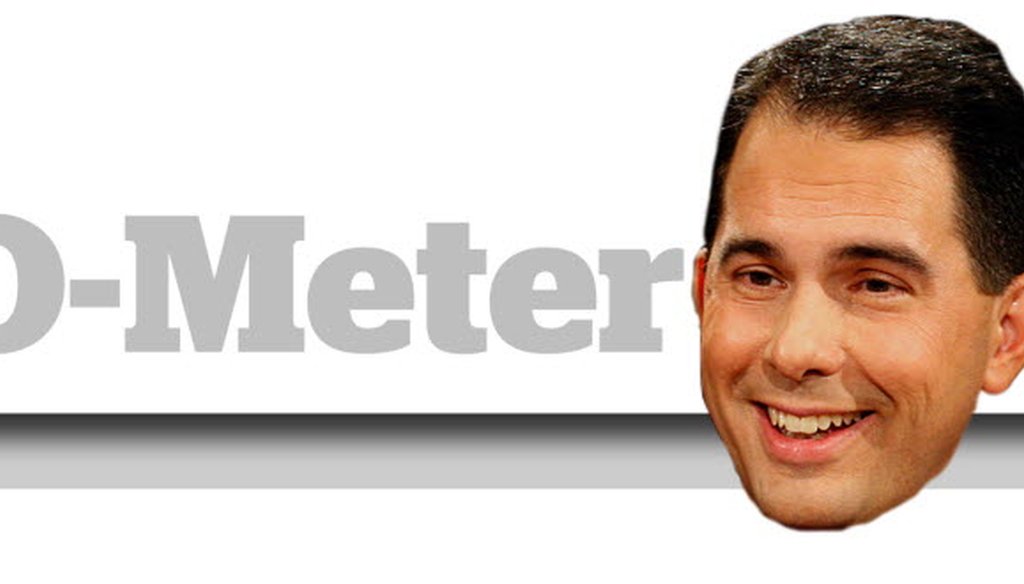Stand up for the facts!
Our only agenda is to publish the truth so you can be an informed participant in democracy.
We need your help.
I would like to contribute

The Walk-O-Meter tracks 60-plus promises made by Gov. Scott Walker on the campaign trail.
Gov. Scott Walker scored more victories than defeats in 2011 on promises related to creating a more favorable tax climate that he hopes will attract and keep business in Wisconsin.
That’s based on a look at how Walker has scored on business-related campaign promises listed on our Walk-O-Meter, which tracks 60-plus promises Walker made in the 2010 campaign.
Lobbyists for big and small business were thrilled that several tax-cut measures won approval in Madison in 2011 -- even in a time of tight budgets and an economy that is sapping income and therefore tax revenues.
Manufacturers in particular won big when a measure from state Sen. Glenn Grothman, R-West Bend, was inserted into the budget. It virtually phased out income taxes on production earnings.
"From a tax standpoint you couldn’t find a better state to be in than Wisconsin," said James Buchen, chief lobbyist for Wisconsin Manufacturers & Commerce.
Critics said it was a case of Walker rewarding business at the expense of the middle class and argued the tax reductions should not have been made when so many other budget cuts were needed.
Here’s a closer look at how Walker scored out on business and tax promises last year:
Walker pledged during the campaign to reduce the business tax burden, even promising in his first budget to "repeal" in his Democratic predecessor Jim Doyle’s moves to raise capital gain taxation and to eliminate a corporate tax loophole by requiring "combined reporting" of corporate profits.
Walker wound end only making modest changes in capital gains, and he tweaked but did not end combined reporting. That earned him Compromise ratings on the Walk-O-Meter.
He earned a Promise Broken rating for failing in his first budget to deliver on dumping Doyle’s new top income tax bracket for individuals. Critics said the new rate could dissuade CEOs from moving their firms here. It could resurface down the road.
Walker got a Promise Kept rating on three of his business tax promises -- including on cutting manufacturing taxes, the biggest of the bunch.
The Legislative Fiscal Bureau estimates the manufacturing measure will mean reduced taxes of $359.7 million over its first five years, and $128.7 million a year once it is fully phased in starting in 2016.
The manufacturing tax credit also applied to agricultural businesses. And it comes on top of tax changes years ago that made manufacturing equipment, pollution-control equipment, and manufacturing stock and inventory exempt from property and sales taxes.
We called that a Promise Kept in July 2011 after Walker signed the two-year state budget.
A smaller scale change Walker promised came to fruition in the governor’s first month. Walker signed legislation that would provide a total personal income or corporate tax break for two years for businesses that relocate here. The incentive is retroactive to Jan. 1, 2011.
The bill had bipartisan support, we noted in giving it a Promise Kept.
Walker also pledged to implement a tax-related plan aimed at enticing so-called "angel" or "venture capital" investors to put funds into businesses in need of a boost.
Walker inserted a version of this plan into his 2011-’13 state budget plan. It was tweaked by the Legislature, approved and signed into law in the summer of 2011.
State policy analysts and outside observers argue over the plan’s potential effectiveness, but experts agree the changes do lower taxes on business investment capital for some firms.
That was also rated Promise Kept.
Finally, Walker made a related proposal on the campaign trail, to give a break to businesses that move here but are not subject to the corporate income tax.
"My proposal provides a relocation tax credit up to 50% of moving costs," he wrote on his campaign web site. "This tax credit is deferrable for up to 10 years, providing new businesses plenty of time to establish roots and grow their workforce."
This piece did not get included in Walker’s package of tax cuts in 2011 and has not at this point been revived, according to the governor’s office, business lobbyists, tax experts and state budget documents. We gave it a rating of Stalled.
The bottom line on whether Walker reduced taxes on employers -- a blanket promise he made as a candidate -- was rated as In the Works.
Our Sources
Legislative Fiscal Bureau,summary of tax changes in state budget 2011-'13, June 13, 2011
Milwaukee Journal Sentinel,"Walker’s proposed capital gains tax gets lukewarm backing" March 5, 2011
Legislative Fiscal Bureau,Comparative Summary of Budget Recommendations, 2011 Act 32, August 2011
Legislative Fiscal Bureau,State Tax and Fee Modifications included in 2011 Act 32, July 5, 2011
Interview with Rob Reinhardt, Legislative Fiscal Bureau program supervisor, Tax Policy, Children and Families and Workforce Development section, Jan. 3, 2012
Email exchange with Jack Norman, research director, Institute for Wisconsin’s Future, Jan. 3, 2012
Interview with Zach Brandon, director of the Wisconsin Angel Network, Jan. 3, 2012
Email exchange with Cullen Werwie, spokesman for Governor Scott Walker, Jan. 4, 2012
Interview with James Buchen, chief lobbyist, Wisconsin Manufacturers & Commerce, Jan. 4, 2012
Milwaukee Journal Sentinel,"Business production tax break added to state budget," June 6, 2011
Wisconsin Manufacturers & Commerce, "Wisconsin business climate improves in 2011," Dec. 20, 2011





















































